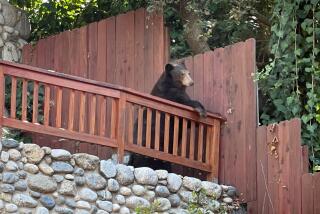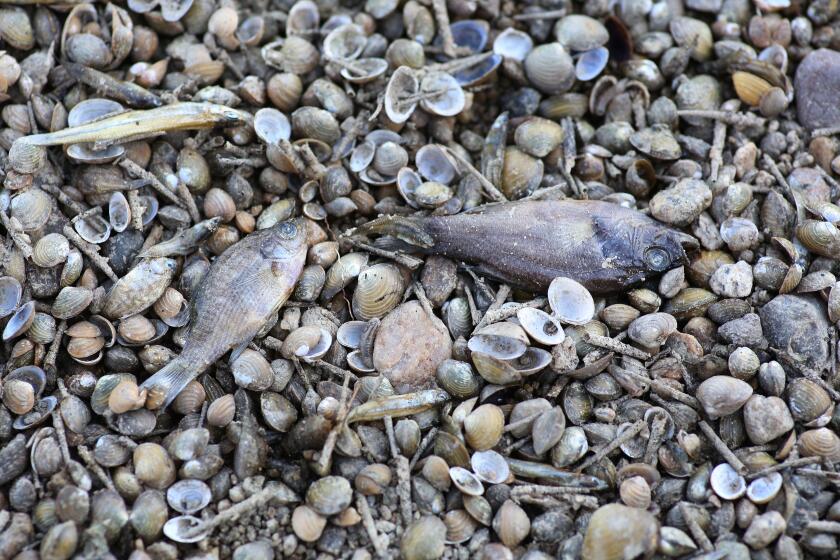La Canada Planners Near Vote on Horse-Keeping Restrictions
The La Canada Flintridge Planning Commission, after four emotional public hearings, is nearing completion of an ordinance that would preserve the city’s horse areas while tightening restrictions on how the horses are kept.
The ordinance comes in the wake of neighbors’ complaints about dust, flies and odors from the horses.
At its Tuesday meeting, the commission finished a second revision of the ordinance, which would place stricter rules on horse keeping than the Los Angeles County regulations under which the city now operates.
The ordinance, however, still must be approved by the commission before it is sent to the City Council.
Changes in Law
Major changes that the ordinance would make include limiting to five the number of horses that can be kept at a residence before a permit would be needed, allowing “accommodation” boarding of friends’ horses for non-commercial purposes, prohibiting horses from being kept on lots smaller than 15,000 square feet and establishing specific maintenance standards to reduce dust, flies and odors.
The ordinance appeared to satisfy most of the concerns of both the horse owners and their neighbors.
“We can live with it,” said horse owner Marilyn Orr, who keeps seven horses at her 1.3-acre Commonwealth Avenue residence. “I think pretty much everything that they’ve come up with is a good idea.”
Horses Compared to Children
But Orr said that, if she were unable to get a permit to keep her two extra horses, she would move. Under the draft ordinance a permit will be denied if two or more neighbors object. “It’s like being told you have to get rid of your children,” Orr said about the possibility of having to part with her horses.
Walter Reichardt, an Oakwood Avenue resident who does not own horses, said he would prefer that the number of horses permitted be limited to four and that boarding of horses be banned.
“Otherwise, I compliment the Planning Commission on getting through a very difficult series of meetings,” Reichardt said.
Other Animals Included
Although the ordinance covers the keeping of other animals--donkeys, mules, other equine, cattle, sheep and goats--horses are its focus.
Horse owners, worried that proposed regulations would be too restrictive, have insisted on preserving what they consider to be a tradition in La Canada Flintridge, one of the few places left in the county where horses can be kept on residential property. Their neighbors who do not own horses, however, have been just as vocal in their insistence that the city do something about horse owners who they say abuse their privilege by keeping too many horses or by not cleaning up after their animals.
The commission refrained from approving the ordinance Tuesday in order to give city staff time to print a formal version that will be voted on at the commission’s next meeting in October. “We want the redrafts printed so we can see them and read them,” said Chairman Thomas Stoever. Further revisions have not been ruled out and could be made at the October meeting, he said.
Limits in Ordinance
The ordinance would allow the keeping of two animals on a 15,000-square-foot lot, with one additional animal permitted for every 5,000 square feet until the maximum of five animals is reached. Permits to keep more than the maximum would have to have approval of the city Director of Community Development. Those with excess animals who do not obtain a permit would be given up to one year to get them off their property.
Annually renewable permits would also be required to conduct animal club activities, such as the Pony Club that meets regularly at one location.
Distance Requirement
The ordinance also includes a minimum distance of 35 feet between structures where animals are kept overnight and neighboring dwellings.
Boarding of animals would be allowed as long as the service were not advertised and did not result in a profit.
To ensure that health standards are upheld, animal owners would be required to maintain a sprinkler system to control dust, to spread lime or other materials to eliminate odors, to spray at least once a day to control flies, to collect manure once a day and place it in a covered container, and to remove accumulated manure from the premises at least once a week.
More to Read
Sign up for Essential California
The most important California stories and recommendations in your inbox every morning.
You may occasionally receive promotional content from the Los Angeles Times.










